
Ekonomika i Matematiceskie Metody-Economics and Mathematical Methods
Scope & Guideline
Pioneering New Frontiers in Economic Research and Methodology
Introduction
Aims and Scopes
- Economic Modeling and Analysis:
The journal emphasizes the development and application of mathematical models to analyze economic systems, including agent-based models, dynamic models, and optimization techniques. - Statistical and Econometric Methods:
There is a strong focus on employing statistical analysis and econometric methods to derive insights from data, assess relationships, and forecast economic indicators. - Interdisciplinary Approaches:
The journal encourages interdisciplinary research that combines economics with fields such as sociology, environmental science, and information technology, reflecting the complexity of modern economic challenges. - Policy Implications and Practical Applications:
Research published often seeks to inform policy decisions and practical applications in various sectors, particularly in the context of the Russian economy and its regional specifics. - Innovation in Economic Theory:
The journal explores innovative theoretical frameworks and concepts, such as mesoeconomics and network economies, that challenge traditional economic paradigms.
Trending and Emerging
- Agent-Based Modeling:
There is a rising trend in the use of agent-based modeling to simulate complex interactions within economic systems, allowing for a more nuanced understanding of agent behavior and economic dynamics. - Sustainability and Renewable Energy Economics:
Recent papers show an increasing focus on the economic implications of transitioning to renewable energy sources, emphasizing the relevance of sustainability in economic modeling and policy. - Big Data and Predictive Analytics:
The integration of big data techniques and predictive analytics is becoming more prominent, reflecting a broader trend in economics towards data-driven research methodologies. - Economic Impacts of Global Events:
Research addressing the economic impacts of global events, such as the COVID-19 pandemic, has gained traction, emphasizing the need for adaptive economic models that account for sudden shifts in the economic landscape. - Socio-Economic Interactions:
Emerging themes that explore the interactions between economic factors and social behaviors are becoming more prevalent, indicating a growing interest in the socio-economic dimensions of economic modeling.
Declining or Waning
- Traditional Economic Theories:
There has been a noticeable decrease in papers focused solely on classical economic theories, as the journal shifts towards more applied and innovative methodologies. - Static Economic Models:
The use of static models, which do not account for dynamic interactions or time-dependent factors, appears to be waning in favor of dynamic and agent-based modeling approaches. - Single-Dimensional Analysis:
Research that employs single-dimensional analysis of economic factors without considering broader interactions and complexities has become less common, indicating a trend towards more holistic approaches. - Descriptive Studies:
There is a decline in purely descriptive studies that lack quantitative analysis, as the journal increasingly favors research that employs rigorous mathematical or statistical techniques.
Similar Journals
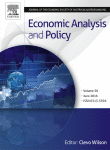
Economic Analysis and Policy
Fostering Excellence in Economic Research and PracticeEconomic Analysis and Policy is an esteemed academic journal published by ELSEVIER, dedicated to advancing the field of economics and econometrics since its inception in 1970. Based in the Netherlands, this journal plays a pivotal role in disseminating high-quality research that addresses contemporary economic issues and policy challenges. With an impressive Q1 ranking in both the Economics and Econometrics categories, and recognition in the top 91st percentile of Scopus rankings, it is a leading platform for scholars, professionals, and students seeking to contribute to and engage with the evolution of economic thought. The journal does not currently operate on an open access model, allowing it to maintain rigorous peer-review standards that ensure the integrity and impact of published research. As a vital resource for anyone interested in the intersection of theory and policy in economics, Economic Analysis and Policy fosters a community committed to rigorous analysis and innovative solutions in the economic domain.

JOURNAL OF QUANTITATIVE ECONOMICS
Elevating Economic Understanding with Quantitative ExcellenceJOURNAL OF QUANTITATIVE ECONOMICS, published by SPRINGER, is an influential academic journal focusing on significant quantitative methodologies in the field of economics. With its ISSN 0971-1554 and E-ISSN 2364-1045, the journal aims to deliver high-quality research that explores theoretical and empirical applications in economics and related disciplines. Operating from Switzerland, this journal has gained recognition for its contributions, achieving a position in the Q3 quartile for Business and International Management, Development, and other related categories in 2023. While it does not currently offer open access, it is accessible through various libraries and institutions for scholars interested in advancing their understanding of quantitative economic analysis. By fostering a dynamic dialogue among researchers and practitioners, the JOURNAL OF QUANTITATIVE ECONOMICS plays a crucial role in shaping insights and driving innovation within the economic landscape today.
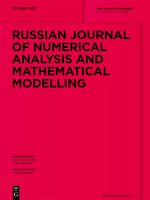
RUSSIAN JOURNAL OF NUMERICAL ANALYSIS AND MATHEMATICAL MODELLING
Charting New Territories in Computational MathematicsRUSSIAN JOURNAL OF NUMERICAL ANALYSIS AND MATHEMATICAL MODELLING, published by WALTER DE GRUYTER GMBH in Germany, is a vital resource for researchers and practitioners in the fields of numerical analysis, mathematical modeling, and computational mathematics. With an ISSN of 0927-6467 and an E-ISSN of 1569-3988, this journal has been disseminating significant findings since its inception in 1986 and continues to do so into 2024. Despite its current position in Q4 category quartiles and modest Scopus rankings, it provides a platform for innovative research that contributes to the evolution of modeling and simulation techniques. The journal is committed to fostering an understanding of complex numerical methods and their applications across various scientific disciplines. Although it does not provide Open Access options, it remains a key publication that underscores the importance of rigorous mathematical analysis and its practical implications in today's technology-driven world.

International Advances in Economic Research
Empowering Scholars Through Rigorous Economic ResearchInternational Advances in Economic Research, published by SPRINGER, stands as a significant resource within the field of economics and econometrics, consistently contributing to the theoretical and empirical understanding of economic phenomena since its inception in 1995. With an ISSN of 1083-0898 and E-ISSN of 1573-966X, this journal is dedicated to advancing economic research through a rigorous peer-review process and disseminating high-quality scholarly articles. The journal's esteemed classification places it in the third quartile (Q3) within the Economics and Econometrics category for 2023, indicating its respectable standing in academic circles. It serves as an important conduit for the dissemination of innovative economic theories, data analysis, and policy discussions, appealing to researchers, professionals, and students alike. Though not an open-access journal, it provides valuable subscription-based content that enriches the understanding of diverse economic issues and fosters a community of inquiry among academics. With its projected outlook extending to 2024, International Advances in Economic Research continues to be an essential platform for scholars aiming to influence and engage with contemporary economic debates.
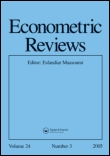
Econometric Reviews
Pioneering Research at the Intersection of Economics and DataEconometric Reviews, published by Taylor & Francis Inc, is a premier journal in the field of Economics and Econometrics, recognized for its significant contributions to the advancement of economic theory and practice since its inception. With its ISSN 0747-4938 and E-ISSN 1532-4168, the journal has maintained a consistent publication record from 1982 to 2024, offering a platform for groundbreaking research that shapes the landscape of quantitative economic analysis. With a proud place in the Q1 category for Economics and Econometrics as of 2023, it stands as a critical resource for scholars, practitioners, and students alike, actively engaging with themes such as econometric methods, theory, and policy implications. Although operating under a subscription model, the journal’s high impact factor reflects its esteem within the academic community, fostering a rich dialogue among researchers in this evolving discipline. The journal’s office is located at 530 Walnut Street, Ste 850, Philadelphia, PA 19106, USA, forging connections in one of the central hubs of economic research.

ECONOMETRICA
Advancing the frontiers of economic thought.ECONOMETRICA, published by Wiley, is a leading journal in the field of economics and econometrics, renowned for its rigorous and cutting-edge research contributions. With an ISSN of 0012-9682 and an E-ISSN of 1468-0262, this esteemed journal holds a prestigious position in the academic landscape, classified in the top quartile (Q1) for both Economics and Econometrics as of 2023, and ranked 42 out of 716 in its field, placing it in the 94th percentile according to Scopus metrics. The journal's scope encompasses a diverse range of topics aimed at advancing economic theory and its practical applications, making it an essential resource for scholars, practitioners, and students alike. Although it operates under a subscription model, the depth and quality of research published in ECONOMETRICA underscore its significance as a cornerstone for intellectual discourse and innovation within the field. Based in the United Kingdom, at 111 River St, Hoboken, NJ 07030-5774, ECONOMETRICA continues to attract high-caliber contributions that shape the future of econometric research.
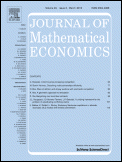
JOURNAL OF MATHEMATICAL ECONOMICS
Exploring the Intersection of Numbers and Markets.JOURNAL OF MATHEMATICAL ECONOMICS, published by Elsevier Science SA, is a premier journal that bridges the gap between mathematics and economics, making significant contributions to both fields since its inception in 1974. This journal is dedicated to publishing high-quality research that applies mathematical methods to solve complex economic problems, thus nurturing an interdisciplinary dialogue essential for advancing both theoretical and practical applications in economics. With an impact factor that reflects its esteemed position (Q2 in Applied Mathematics and Economics and Econometrics as of 2023), the journal ranks prominently within its categories, promoting rigorous analysis and innovative methodologies. The Journal of Mathematical Economics invites contributions from researchers, professionals, and students alike, providing a platform for the dissemination of cutting-edge research that shapes economic thought and policy. Operating without open access, it remains a crucial resource for anyone keen to delve deeper into the mathematical foundations of economic theory, while it continues to evolve and maintain relevance through 2024 and beyond.

Journal of Mathematics in Industry
Transforming Industrial Challenges with Mathematical InsightsJournal of Mathematics in Industry, published by Springer, stands as a pivotal platform for researchers and professionals exploring the intersection of mathematical applications and real-world industrial challenges. With an impact factor signaling its robust influence in the field, the journal has distinguished itself within the Q3 quartile of applied mathematics, ranking 95 out of 635 according to Scopus, placing it in the 85th percentile among its peers. Since its inception in 2011, the journal has embraced the Open Access model, fostering a collaborative and unrestricted dissemination of knowledge. This initiative not only enhances visibility but also encourages engagement from a global audience eager to apply mathematical innovations in various industries. As the journal looks towards the future, it continues to bridge the gap between theoretical mathematical research and practical industrial applications, making it an invaluable resource for academics, practitioners, and students alike.

JAPAN JOURNAL OF INDUSTRIAL AND APPLIED MATHEMATICS
Fostering Interdisciplinary Insights in Applied MathematicsThe Japan Journal of Industrial and Applied Mathematics, published by Springer Japan KK, is a pivotal platform for disseminating cutting-edge research in the fields of applied mathematics and engineering. With an ISSN of 0916-7005 and an E-ISSN of 1868-937X, this journal has been a cornerstone in the academic community since its inception in 1991 and will continue to contribute pivotal insights through 2024. Positioned in the Q3 category for both Applied Mathematics and Miscellaneous Engineering according to 2023 rankings, it is recognized for its diverse range of topics and interdisciplinary approaches. Despite its competitive ranking, the journal fosters valuable contributions that challenge conventional methodologies and inspire innovation. Researchers, professionals, and students alike will find the journal’s contents invaluable for advancing knowledge and exploring new methodologies in industrial and applied mathematics.
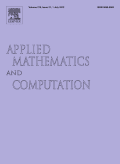
APPLIED MATHEMATICS AND COMPUTATION
Pioneering Solutions with Computational ExcellenceApplied Mathematics and Computation is a premier journal dedicated to the dissemination of high-quality research in the field of applied mathematics and computational methods. Published by Elsevier Science Inc, this influential journal has established itself as a key resource for researchers, professionals, and students interested in mathematical modeling, numerical analysis, computational algorithms, and their applications across various disciplines. With an impressive impact factor reflecting its scholarly credibility, it holds a distinguished position in the Q1 quartile for both applied and computational mathematics as of 2023, ranking #31/635 and #12/189 in Scopus categories respectively, thereby indicating its significant impact on the academic community. The journal encompasses a broad spectrum of topics, encouraging original research, critical reviews, and innovative methodologies that address real-world challenges. Although it currently does not offer open access options, it remains a cornerstone publication for those at the forefront of mathematical research, continuously bridging theory with practical computation since its inception in 1975.